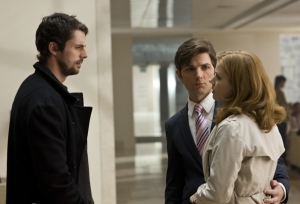Awards season is in full swing in L.A. and I’ve been going to a lot of screenings. Tonight is Clint Eastwood’s American Sniper with Bradley Cooper as Chris Kyle and later this week is Into the Woods. Both movies will be released December 25. Check back for those reviews.
 Today I’m talking about The Imitation Game (out November 28), based on Andrew Hodges’s book Alan Turing: The Enigma, starring Benedict Cumberbatch as Turing, who’s widely regarded as the father of digital intelligence and the modern computer.
Today I’m talking about The Imitation Game (out November 28), based on Andrew Hodges’s book Alan Turing: The Enigma, starring Benedict Cumberbatch as Turing, who’s widely regarded as the father of digital intelligence and the modern computer.
The film covers the period during World War II when Turing built a machine that cracked the Germans’ Enigma encryption, helping the Allies win the war and saving millions of lives. Turing and his colleagues were not allowed to talk about their work, and instead of being heralded a hero, Turing was prosecuted for indecency because he was gay.
Cumberbatch’s performance is top-notch. I wonder if he’s being pigeonholed as the go-to actor to play abrasive, antisocial geniuses, but here he has moments of vulnerability not seen in his portrayal of Sherlock Holmes in the BBC series or Julian Assange in The Fifth Estate.
Even more heartrending is Alex Lawther, who plays the young Turing in flashbacks. Lawther has mastered the trick of displaying no expression on his face while showing clearly the emotional devastation that lies right beneath his skin.
The actors playing Turing’s fellow cryptanalysts, including Keira Knightley as Joan Clarke and Matthew Goode as Hugh Alexander, are all solid. Director Morten Tyldum, who had previously directed another screen adaptation of a book (Jo Nesbo’s crime novel Headhunters), manages to inject an element of suspense into a story mostly about people sitting around trying to crack a code. Game moves you and makes you feel smarter—the type of film Hollywood needs more of.
Nerd verdict: Smart Imitation
Photo: The Weinstein Company



